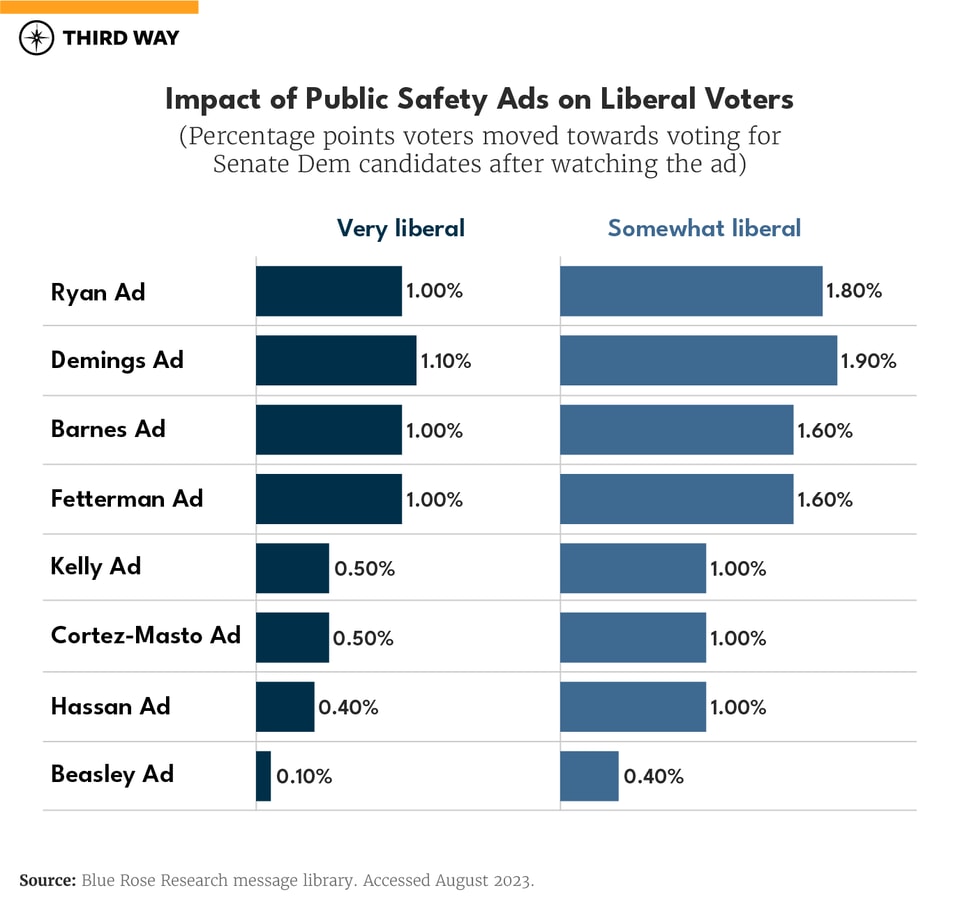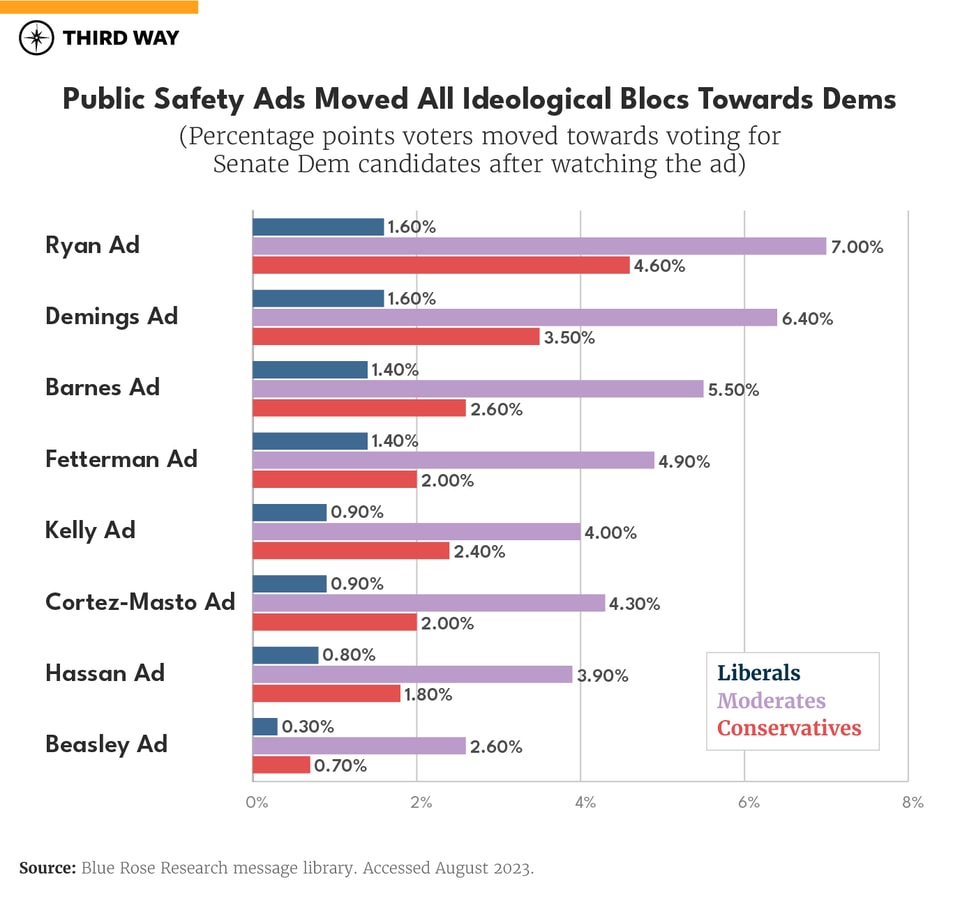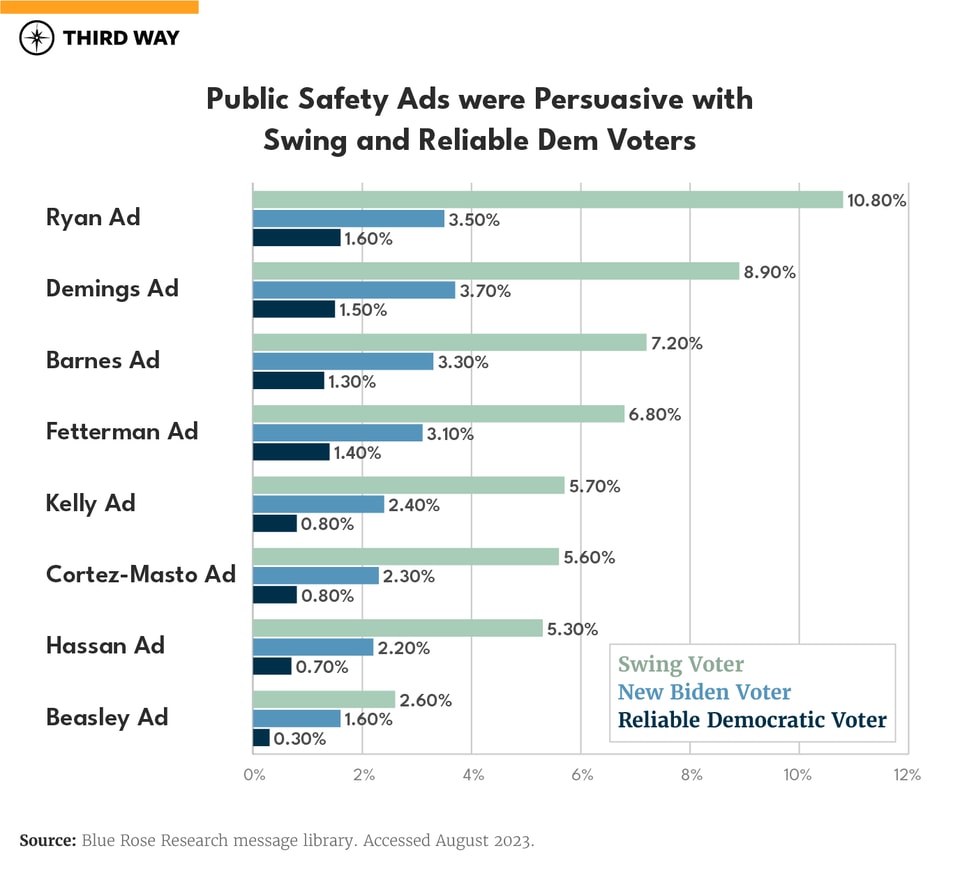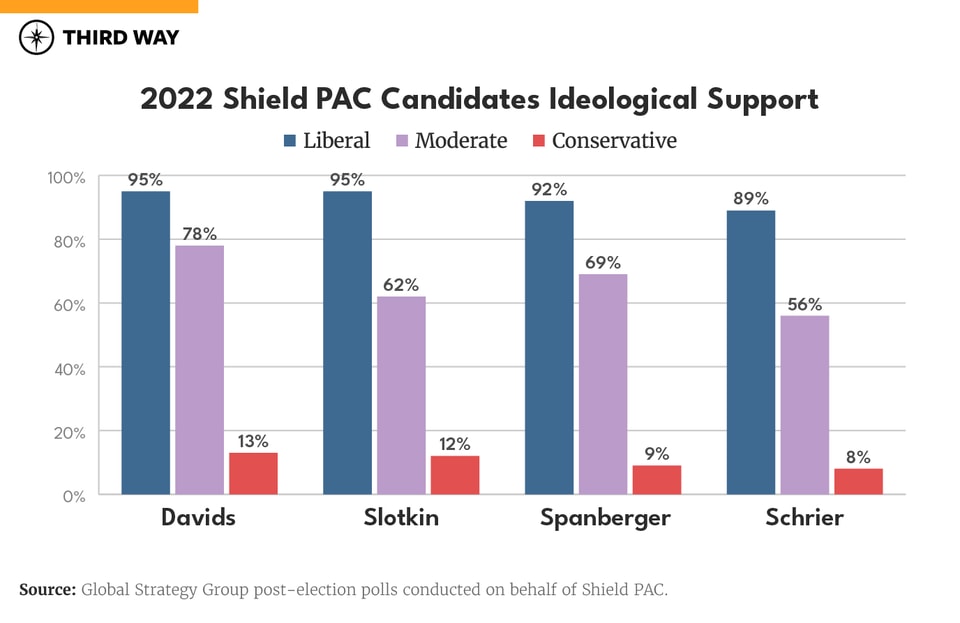Memo Published September 5, 2023 · 6 minute read
Democratic Pushback on Crime: A Win with Both Swing and Base Voters
Lucas Holtz

During the 2020 election cycle, Donald Trump and the Republican Party launched an aggressive culture war strategy, attacking Democrats as radical supporters of crime and the instigators of chaos at the border. These attacks put Democrats on their back foot in 2020, but when the midterms came, they were ready. And despite the GOP launching a barrage of culture war attacks in 2022—spending hundreds of millions of dollars in advertisements around these issues just in the top US Senate races—Democrats held their own and were well prepared to denounce and rebut the fire strike of misleading GOP ads this last cycle. In fact, Blue Rose Research founder David Shor ran a study that found that ads in which Democratic candidates explicitly stated that they did not support “defunding the police” were 1.8 times more effective than the average Democratic advertisement.
We know that strong prebuttals and rebuttals around crime were effective with swing voters, but did such messaging cost candidates with the Democratic base? New data from the 2022 midterms shows that the pushback from Democratic candidates indeed helped persuade swing voters, but it also had a positive effect with the liberal base.
Senate Races
Some in the Democratic Party have suggested that if Democrats were to explicitly denounce “defunding the police,” it would serve as a detracting factor in Democrats’ candidacies—the most detrimental effect, the argument goes, would be alienating and turning off Democrats’ most far-left base of support. However, this hypothesis simply does not hold up when examining the effect that public safety ads had in the midterms.

According to surveys conducted by Blue Rose Research, public safety ads from Tim Ryan (OH), Val Demings (FL), Mandela Barnes (WI), John Fetterman (PA), Catherine Cortez Masto (NV), Mark Kelly (AZ), Maggie Hassan (NH), and Cheri Beasley (NC) all had a positive effect in moving “very liberal” and “somewhat liberal” voters marginally towards casting a ballot for Democrats. Ryan’s ad had a 1% positive effect of moving very liberal voters closer to voting for him—and even Cheri Beasley’s ad, which included several white and Black sheriffs from North Carolina rebutting the GOP’s attacks, did not have a negative effect among liberal voters, contrary to conventional wisdom.

Furthermore, each of these public safety ads that touted increased law enforcement funding and/or explicitly stated that the Democrat did not support defunding the police had a positive effect in moving voters of every ideological bloc towards voting for Democrats, and each ad, aside from Beasley’s, tested well above the median Democratic advertisement.
Former Congressman Tim Ryan, running for Ohio’s US Senate seat, had the highest-testing persuasive advertisement among Democratic public safety ads—and it tested in the 99th percentile of all Democratic ads run in 2022 Senate races. Ryan’s advertisement utilized a law enforcement validator who endorsed his leadership and said:
“Tim Ryan knows defunding the police is ridiculous. He’s brought back $467 million to put good cops on the street. I trust Tim Ryan to keep our community safe.”
The ad’s efficacy was demonstrable and moved the average voter 4.7 percentage points towards casting a ballot for Tim Ryan—7% among moderate voters, 4.6% among conservatives, and 1.6% among liberals.
According to the election analysis organization Split Ticket, their post-election model calculated that Ryan should have lost Ohio’s US Senate race by 11 points, but he overperformed by 5 points and only lost by a 6-point margin—2 points better than Biden in 2020. For context, every other Democrat that competed in an Ohio statewide race last cycle lost by 12 points or more. Ryan’s performance no doubt can be attributed to running on mainstream positions that appealed to a wider swath of the Ohio electorate, including mainstream public safety messaging.
When we examined how law enforcement and public safety ads performed among Blue Rose’s model of swing voters, new Biden voters, and reliable Democratic voters, we saw that they performed exceptionally well with appealing to swing voters in the center without detracting from loyal Democratic base voters or newly minted Biden voters.

House Races
So, this approach was widely successful in the Senate, but how did down-ballot House Democrats who ran on public safety and law enforcement funding fare with their liberal bases? As it turns out, moderate House Democratic incumbents, including Representatives Sharice Davids, Elissa Slotkin, Abigail Spanberger, and Kim Schrier, all ran ads that highlighted their votes to increase public safety and law enforcement funding, all ran on standing up to their own party on the issue, and all directly took on and rebuffed the GOP’s “defund the police” attacks. In short, each of these Congresswomen successfully repelled the GOP’s culture war attacks—and maintained massive support with their liberal base.

Representatives Sharice Davids, Elissa Slotkin, and Abigail Spanberger garnered the support of nearly all ideologically liberal voters, carried supermajorities of self-identified moderates, and peeled off 1 in 10 conservatives in their districts. Congresswoman Kim Schrier similarly garnered the support of 89% of liberal voters and over half of moderate voters. Each ran in one of the most competitive races of the cycle and handily won their re-election bids by 5 points or upward—Elissa Slotkin, who ran in an R+2 partisan-leaning district, won re-election by 5 points, while Sharice Davids, who ran in an R+1 partisan-leaning district, won by 12 points.
Their success is just one more proof point: advertisements that directly take on the GOP’s “defund the police” attacks are worthwhile investments—and rather than turning off base voters on the left, they actually improve performance among them.
Conclusion
It is clear that Republican attacks on hot-button culture war issues are not going away. It is part of the GOP playbook that has been employed cycle after cycle in the era of Trump, and all signs point to the Republican party leaning further into these attacks in 2024. Until 2022, Democrats had left these charges largely unanswered and made voters determine the truth of these culture war attacks on their own. Democrats must be prepared to run an aggressive playbook once again to thwart these attacks, and they should be heartened to know that campaigns that employed some of the most pointed public safety messages in 2022 were able to persuade swing voters and base voters with those communications.
